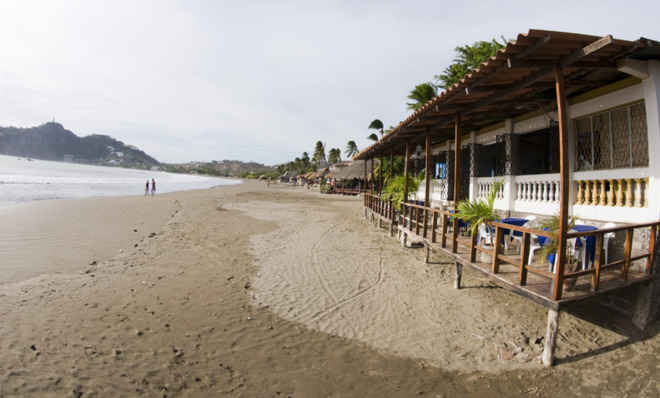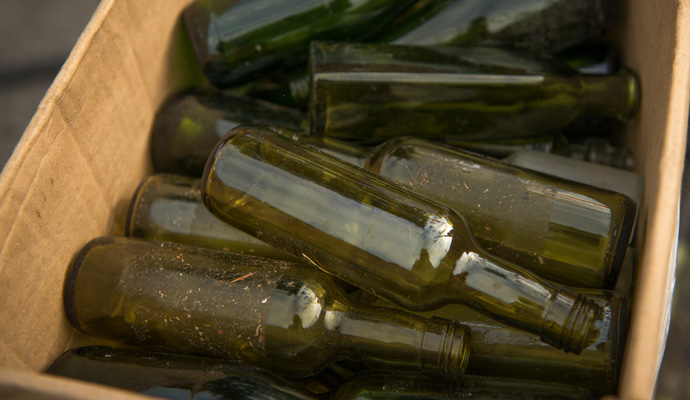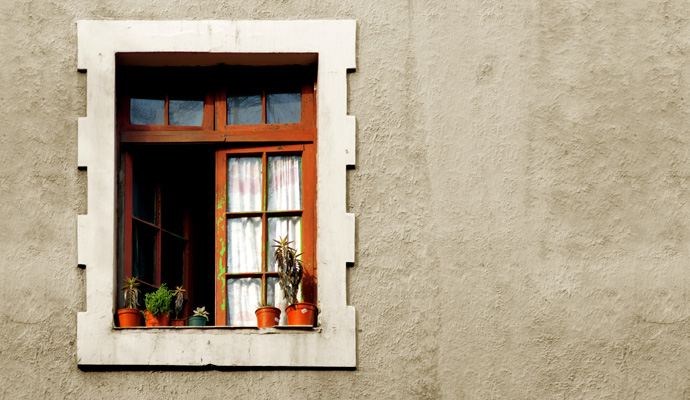The hotel of enlightenment
To get sober, I slept in a mosquito-infested dorm in Nicaragua with 16 other men, subsisted on a diet of rice and beans, and performed labor therapy in the fields

A free daily email with the biggest news stories of the day – and the best features from TheWeek.com
You are now subscribed
Your newsletter sign-up was successful

Some four years ago, while living in Nicaragua, I came to perceive my environment as a world of symbols and signs whose purpose was to tell me a dramatic and mystical story about myself and lead me through it. These symbols, which could present themselves as anything from a gust of wind to a building to a person to an event, were like the words of a hieroglyphic that had always existed but that I had suddenly been given the gift of interpreting.
Before I get to what brought me to Nicaragua, and to the hotel where this phenomenon reached its zenith, I want to say that my goal here is to translate to the reader, with whatever degree of faithfulness memory and ability permit, the experience of what I found to be a powerful and fascinating — if finally unproductive and evanescent — state of mind. I choose not to seek harbor from this labor of description by employing the reductive terminology of the Diagnostic and Statistical Manual and the psychiatric profession, where labels cast a single net over what are profoundly individual experiences and fail to address what I see as a spiritual dimension. If what I describe calls to the reader's mind some particular condition or other, that is a diagnosis I will allow her to reach on her own.
(More from The Big Roundtable: Blood, honor, partition: A survivor's story)
The Week
Escape your echo chamber. Get the facts behind the news, plus analysis from multiple perspectives.

Sign up for The Week's Free Newsletters
From our morning news briefing to a weekly Good News Newsletter, get the best of The Week delivered directly to your inbox.
From our morning news briefing to a weekly Good News Newsletter, get the best of The Week delivered directly to your inbox.
In the summer of 2009, having floundered ever since my father's suicide three years earlier, I decided to leave the United States and go to Nicaragua, the country he was born in, to stay with an uncle and try to find work. By this time I had been an alcoholic drinker for more than 20 years, something that made it difficult for me to hold jobs, stay in any one place for long, or establish an enduring relationship. While I eventually earned an advanced degree and began a profession as a journalist in my mid-30s, the standard expectations of adulthood had never quite been met; my reliance on alcohol as a salve for every discomfort had trapped me in a perpetual adolescence.
When my father died, I quit my job as a newspaper reporter in a small Southern city and relinquished any attempt to control the problem. In an existential panic, I proceeded to hurry from job to job and place to place as urgently as if these places and jobs were burning coals singeing the soles of my feet. I had spent time in Central America before, and its relaxed, anything-goes culture had always appealed to me as an antidote to the pressures of American society. My plan was to go to Guatemala and get sober, then proceed to Nicaragua, but I arrived drunk and wore out my welcome at my uncle's place within a matter of weeks. Rather than change my ways, I left his house and holed up in a cheap hostel in the beach town of San Juan del Sur. My only glimpses of the sand and water and the mountain backdrop that made the town popular with tourists came during my daily walks to the store to replenish my beer supply. After a couple of weeks of this I had run out of money. I called my uncle and asked him to take me to Hodera, a rehab center for drug and alcohol addicts that I had learned about in researching an aborted magazine article on a Nicaraguan boxer who had sought treatment there.

I spent 60 days at Hodera, where I slept in a mosquito-infested dorm with 16 other men, subsisted on a diet of rice and beans, performed labor therapy in the fields, and attended addiction-education classes. By the time I left, the Spanish I had struggled to master all my life was close to fluent, I was 25 pounds lighter, and I had put together more consecutive sober days than I ever had since the age of 16. The day I walked beyond the gate that divided Hodera from the rest of the world, with just enough money for bus fare, it was as if I was seeing everything — a baby, a horse, a woman — for the first time. When the bus dropped me off in Jinotepe, where my uncle lived, I spent nearly an hour on a bench in the central park watching the vendors and passers-by, nearly overwhelmed by the cinematic vividness of it all. I then walked to the office of my uncle's non-profit. He was in Mexico on business, but one of his assistants, a distant cousin of mine, let me in.
My uncle's wife had visited me a week or so before and told me that my uncle was going to help me get an apartment and find work, but when he called the office and found out that I had left Hodera before his return from Mexico (he had asked me to wait, but I was anxious and decided to leave at the end of the customary 60-day term, not thinking that his help was contingent on my staying extra time), he emailed me and said that I was on my own.
A free daily email with the biggest news stories of the day – and the best features from TheWeek.com
(More from The Big Roundtable: The man that wasn't)
I felt his displeasure was the result of a misunderstanding, but I accepted it. At some point at Hodera, in my effort to endure the rigors and drudgery of the place, I had developed a faith that I had never had before: There was no question that things would somehow turn out OK, even if I couldn't know quite how that would happen. This faith carried me through the uncertain hours and days ahead. I had no money and no place to stay but I felt profoundly untroubled.
That day, a young cousin of mine took me out to lunch and told me that he had a friend with a hammock on his terrace who might let me stay with him for a few days. I went to the house, and the friend, who lived with his girlfriend, agreed. The following morning, the kid told me he also had a spare room he would rent to me for cheap. I contacted an uncle stateside and he sent me a small amount of money, enough to rent the room and buy rice and beans for a month. Rehab had conditioned me to spartan conditions, so the situation I found myself in felt like luxury. My room on the second floor of the house even had a balcony; upon awaking I would open the doors that led to it, allowing the mealy light and burning-cedar-scented air of the Nicaraguan dawn to enter the room. I would listen to the tortilla and coconut vendors pushing their carts down the sidewalk below and calling out to pitch their wares as I sat down to write about my recent experiences.

All my life I had wanted to write. I had indeed worked as a professional journalist penning news stories, but it wasn't until I got out of Hodera that I began to be able to write about myself and my own ideas with any honesty or ease. Sobriety had cleared my mind, and my experiences had given me a subject matter to work with. It was the first time I had anything to say other than I want to be a writer, a sentiment which, regardless of how it's presented, inevitably devolves into a solipsistic lament. In the past, writing had been a torturous experience. I would have an idea and write a paragraph on it, but rather than forge ahead to develop the idea, allowing the writing to activate my thinking, I would stop and go back over it, writing and rewriting it until the paragraph was whittled down to a single, painfully overwrought sentence. I would emerge exhausted and depressed from the effort, needing a drink to forget about what a failure I was. Those post-Hodera weeks were the first time I had had the experience of losing myself in the writing; I would bolt awake with an idea, sit down and begin typing. An hour later I would have a decent-sized essay I could then go back and smooth out in tranquility. The self-consciousness and censoring instinct that had previously impeded my writing had been obliterated.
For a month this was how I lived, sleeping no more than three or four hours a night, writing nearly every day and taking long, blissfully aimless walks on the ghostly streets of Jinotepe in the wee hours. When I did manage to sleep, my dreams were more intense than they ever had been. In one I recall, I was crying as I held my mother, a frail old woman in the dream, when she looked up at me and burst into dust in my arms. I would often realize during my dream that I was dreaming and struggle to wake up, but not be able to for what seemed like ten minutes or more, something that felt like drowning and terrified me. I began to look at sleep as a necessary evil. Rather than lie down at some given time at night, I would just stay awake until my body shut down and I crumpled onto my mattress.
(More from The Big Roundtable: Coming of age in purgatory)
In my waking hours, I was outlandishly sensitive to all stimuli; it was as if I had become a walking antenna. My awareness of time became hyper-keen as well. Before, a half hour or even an hour might have passed without my noticing, as I involved myself in something or just tuned out. Now I seemed destined to arrest and contemplate seconds as if they were as spacious as entire minutes. On one of my early morning walks, I passed a home with a gated door. Behind the door was a beautiful Alaskan Huskie with sky-blue eyes. I felt a strong desire to pet the dog, but didn't know if it was friendly. Beginning some ten yards from the animal, I began to move toward it as incrementally as possible, beginning to raise my arm from my hip as I stepped forward, searching its eyes for signs of consent with every step. It must have taken me ten minutes to cover the distance that separated us, until I finally extended my fingers through a space in the gate as its head lifted slightly to meet my palm.
Read the rest of this story at The Big Roundtable.
This story originally appeared at The Big Roundtable. Writers at The Big Roundtable depend on your generosity. All donations, minus a 10 percent commission to The Big Roundtable and PayPal's nominal fee, go to the author. Please donate.
-
 The ‘ravenous’ demand for Cornish minerals
The ‘ravenous’ demand for Cornish mineralsUnder the Radar Growing need for critical minerals to power tech has intensified ‘appetite’ for lithium, which could be a ‘huge boon’ for local economy
-
 Why are election experts taking Trump’s midterm threats seriously?
Why are election experts taking Trump’s midterm threats seriously?IN THE SPOTLIGHT As the president muses about polling place deployments and a centralized electoral system aimed at one-party control, lawmakers are taking this administration at its word
-
 ‘Restaurateurs have become millionaires’
‘Restaurateurs have become millionaires’Instant Opinion Opinion, comment and editorials of the day